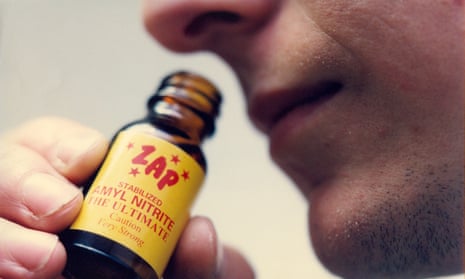In the 1890s, South Australia and Queensland became some of the first jurisdictions in the world to enact laws prohibiting the non-medical use of a particular drug. These laws are the precursors to the modern drug criminalisation regime and would spread across Australia, Canada, New Zealand, the UK and the US over the next 20 years.
These laws prohibited the manufacture, sale and use of opium, but, more than that, they specifically targeted Chinese migrants in their wording and application. Officials justified the legislation by appealing to anti-immigrant sentiment and racist stereotypes such as “the sensual Chinaman”.
Widely regarded as racially discriminatory, these laws were a weapon leveraged against a much-maligned minority. Attitudes about the drug reflected stereotypes and fears about Chinese people, and especially Chinese men.
We can see a parallel in the Therapeutic Goods Administration’s proposal to criminalise a family of alkyl nitrites commonly referred to as “amyl” or “poppers”. The ban would see poppers placed in the same category as heroin and the sale, use and possession of amyl would carry serious charges.
For the uninitiated, these inhalants expand blood vessels and lower blood pressure, and are used recreationally in dance culture to produce a very brief “high”. Poppers additionally have analgesic and muscle relaxant effects which make sex, particularly anal sex, more comfortable and pleasurable.
The TGA identifies the use of poppers for euphoric, analgesic and muscle relaxant purposes as “illicit” – questionable language when discussing something typically used by the LGBTI community. A 2017 report from the Flux study showed that 32% of gay and bisexual men self-reported using amyl nitrite in the previous six months.
We can easily see that Australia’s old opium laws prejudicially targeted a racial minority and, in the same way, we can consider how the proposed ban on poppers might implicitly criminalise homosexual sex. Indeed, some of the justifications for the prohibition are grounded in homophobic tropes, such as the common stereotype that gay men are sexual predators, paedophiles or endanger children.
The TGA’s September report argues that the “sweet” aroma of poppers poses a risk to child safety through the possibility of accidental ingestion, which happened 10 times between 2004-2014. To put this in perspective, 20 children are admitted to hospital each week after ingesting button batteries.
Moving past the fact that poppers more accurately smell like paint thinner, the implication is that gay and bisexual men are a threat to children. Further, the report goes on to repeat the assertion that paedophiles use nitrites to sexually assault children no fewer than six times, citing a report from 1993 that concluded there was no evidence for this claim.
The TGA additionally argues for criminalising poppers on the basis that misuse can cause headaches, dizziness and nausea, or exacerbate glaucoma and circulation problems. This is mostly true. However, the same can be said of the sex aid Viagra, mainly used by heterosexual men, which can cause headaches, dizziness, congestion, diarrhoea and rashes in addition to exacerbating existing conditions but which is, nevertheless, approved by the TGA.
It is difficult to argue that a ban on poppers does not directly discriminate against gay and bisexual men, or, more broadly, people wishing to engage in pleasurable sex. Additionally, there is no reason to believe that a ban would be effective. As the former Australian federal police chief Mick Palmer explained: “Nothing we’ve banned for the illicit drug marketplace has had much difference and this will be no different.”
Indeed, there is scant evidence that criminalisation helps people, while there is a mountain of research that suggests that harm minimisation strategies, such as pill testing, saves lives. However, we should also ensure that we consider the social context of drug laws and whom they effect.
In hindsight we can see that historical opium laws weren’t really about the drugs themselves but about marginalising a minority. In a context where 80% of gay and bisexual men report using drugs (including amyl) over their lifetime, we might ask: what is drug criminalisation meant to achieve?
